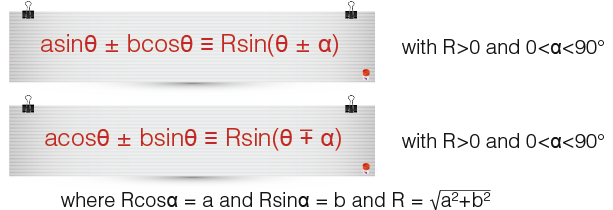Expressing acosθ + bsinθ in terms of cosine and sine functions
This article is a continuation from the previous trigonometry article. This article covers how to write expressions of the form acosθ + bsinθ , where a and b are constants, as a sine or cosine function only.
Using the addition formulae, we can shows that all expressions of the form acosθ + bsinθ can be expressed in either;

You must be aware that the graph of y=af(x – α) is the graph of y=f(x) stretched vertically by a factor of a and translated by α. We can use the ‘R formula’ to solve equations of the form acosθ + bsinθ = c, where a, b, and c are constants but if c=0, the equation reduces to the form tanθ = k. Expressions of the form asinθ + bcosθ can be rewritten in terms of sine and cosine using the following rules when a and b are positive.

…with R>0 and 0<α<90° ...where Rcosα = a and Rsinα = b and R =√(a² + b²)
Below we shall explore through some examples;
Example
In this example we shall show that 3sinx + 4cosx can be expressed in the form Rsin(x + α), where R>0, 0<α<90°. We shall also note down the values of R and α
Note also here that we know that;
![]()
If we multiply the expression through by R we get the following expression;
![]()
…since we’re trying to write 3sinx + 4cosx into Rsin(x + α) we let;
![]()
Note here as well that for the above expression to be true all values of x, the coefficients of sinx and cosx on both sides have to be equal therefore…
![]()
…we need to find R and α.
Let us start by finding α. We know that sinα divide by cosα is tanα, therefore we could;
![]()
…so since sinα over cosα is tanα we get;
![]()
Next we shall find R. To do that we shall square Rcosα and Rsinα and add them together then we shall find R² so we have,
![]()
…factorise the left hand side to get;
![]()
Remember cos²α + sin²α is equal to 1, that must mean that;
![]()
We have managed to find R and α to rewrite 3sinx + 4cosx as Rsin(x + α)so we have;
![]()
Note here also you could rewrite;
![]()
…by setting…
![]()
…and then solve to find R and α.
Example
Here is another example, In this example we shall express sinx -√3cosx in the form Rsin(x – α) …we shall also sketch the graph of sinx – √3cosx. First we want;
![]()
…and we know that this gives;
![]()
Note that for RHS we have simply expanded sin(x-α) and multiplied by R. Using the expression above we find that;
![]()
…we have compared the coefficients of sinx and cosx on both sides of the expression. We need to find α first and we know that sinα/cosα = tanα so we divide Rsinα by Rcosα;
![]()
The Rs cancel each other out, so we find that;
![]()
…we do the same to find R as we did above;

…we can conclude that;
![]()
The graph is simply a sketch and a translation. To sketch 2sin(x – π/3), we translate y=sinx by π/3 to the right and then stretch it by a scale factor of 2 in the y-direction as shown below;
[visualizer id=”5549″]
Example
In this example we will express 2cosθ + 5sinθ in the form Rcos (θ – α) and then we shall solve the expression 2cosθ + 5sinθ = 3 for 0 < θ < 360°
We need to express;
![]()
…we know α should be between 0 and 90° and R should be greater than 0 and we know that;
![]()
…so we have;
![]()
We shall need to compare the coefficients of sinx and cosx on both sides of the expression, so we have;
![]()
Another method we could use to find R is by making R the subject in the expressions above. Then draw the triangle for example Rsinα = 5;

…so we get;
![]()
…and…
![]()
…since we have worked out R and α, we find that;
![]()
Now we need to solve the equation 2cosθ + 5sinθ = 3. The solutions will be the same for √29cos(θ – 68.2°) = 3 as we have found out above; 2cosθ + 5sinθ = √29cos(θ – 68.2°). We simplify both sides by √29 so we have;
![]()
Using the calculator to find;
![]()
…so now we’re trying to find θ – 68.2°
![]()
